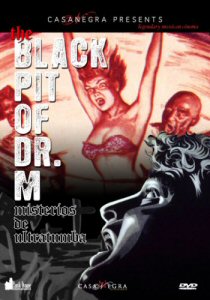
Ahead of its time, and possessing a higher degree of characterization and believability than many other Mexican horror outings of its time, The Black Pit of Dr. M merges the occult with the scientific in a surprisingly serious, chilling manner. Unleashing supernatural images amidst a marvelously detailed backdrop of realism, the more sensationalistic horrific elements of the film are lent emotional power and context by an emphasis on the tragedy of loss. Taking his story and characters seriously, director Fernando Mendez explores the nightmarish world of the genuinely disturbing supernatural through the aesthetic lens of a damaged psyche. Innovative in its level of seriousness, the film is also notable for its non-traditional treatment of controversial themes in a cultural cinema often noted for its conservatism. Crossing acceptable boundaries of cultural and cinematic taste by treating so intimately such distressing concepts as mortal loss, amorality, and the forbidden quest for knowledge, this picture, bleeding with atmosphere, compares science with the forbidden arts of black magic in its main character's foolhardy if Byronic quest to shatter the boundaries between life and death.
A modern B-movie rendition of a timeless literary motif whose origins may be traced to ancient mythology and folk legend, this subversive, lusciously filmed study of man seeking the powers of the gods is an adroit parable of hubris and its consequences. Both a celebration of, and warning against, unrestrained ambition, Dr. Mazali's brazen yet ultimately understandable quest for forbidden knowledge encourages us to look deep inside Pandora's box, while the director's complex depiction of this character, somewhere between sympathetic and admonitory, mirrors our own conflicting admiration and fear of such figures. In this, the basic plot, a story of man striving to attain supernatural powers/knowledge, reaching past the experiences allowed our species, is both a thrilling genre thriller and mature tragedy. Dr. Mazali (Rafael Bertrand) runs an insane asylum, masquerading as a caring doctor by day. Yet when night falls, covering the bleak landscape in black, so too do shadows of moral corruption descend over his conscience. Striving beyond the reach of human kind, he engages in secret arts to sever the boundaries between this world and the next. Combining mystic enchantments with the rationality of science, Mazaili desperately braves supernatural threats to his mind and soul to contact Dr. Harrison (Jacinto Alama), his old colleague and friend, who was executed in an abortion of justice. The emotionally effective maelstrom of madness, that results from this disruption of cosmic balance is at once sensational and meditative, as firm in its desire to shed serious insight into the deterioration of the human soul as it is to create for the viewer a poetic nightmare.
Supporting shocking explosions of violence with subtle moments of more suggestive supernatural frights, The Black Pit of Dr. M is a modern masterpiece of grand gothic sentiment, taking on cosmic questions of identity and the unknown in a context that is both larger than itself yet intimately anchored in the context of everyday life. Beautiful images of decay and subliminal beauty lend a convincing emotional/textual relevance to the plot, lending all a dream-like aura. It is to the movie's credit that a majority of the scares are internal, as this allows them to weigh deeper in the mind. More unsettling than sensational, the movie combines gothic imagery with scientific approach, both of which are mirrored (and lent further verve) by never swerving commitment to characters themselves -- real people, not simply the caricatures so often employed in tales of terror. Amidst the ghosts and occult manifestations is a screenplay and set of performances dedicated to the pain of loss and the inability of humanity to face earthly limitations. Dr. Mazali is a convincing, thoroughly modern "Faustus" figure, damning himself and challenging the universe. As such, he lends the film a general air of tragic resonance not often seen, while the director's use of a peering camera, spectral atmosphere, and noir-inspired settings support this vision.
CasaNegra again shows the love they have for these films, presenting this rare horror tragedy in its original uncut edition, re-mastered and with a host of extras. The full frame picture (1:33) is free from grain or scratches, with clear depth precision. Audio for this spectacle is Spanish Dolby Digital Mono (1.0), featuring the original Spanish language version with optional English subtitles. An audio commentary by IVTV founder Frank Coleman is insightful and friendly, easily worth a listen. Enthusiastic and personable, Coleman's monologue discusses the aesthetics of the film (and the genre in general), proving to naysayer why they such films deserve to be seen. Also included is a top-notch photo essay: "Mexican Monsters Invade the U.S. Worthy as both a historical archive and as a nostalgic treat, this is nothing less than a well deserved salute to K. Gordon Murray, whose efforts to repackage and dub these films led to their gradual preservation and enjoyment. The less worthy while entertaining "Black Pit of Dr. M" Rock Video (composed by 21st Century Art) delivers a multi-medial collage of images and tunes, while, the original 1961 English Continuity Script allows a peek at the working process of cinematic storytelling. Text Essays are represented by the well researched Biography on Director Fernando Mendez by David Wilt and a Biography of Gaston Santos. An original theatrical trailer, poster and stills gallery, and yet another colorful CasaNegra Loteria Game Card rounds out this package.
Review by William P. Simmons
| Released by CasaNegra |
| Region 1 - NTSC |
| Not Rated |
| Extras : |
| see main review |